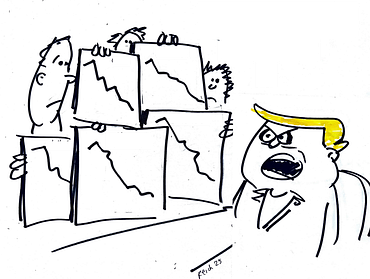|
Prices and unemployment are heading up. Everything else is going down
The economy is heading into very bad weather. Brace yourselves.
Friends,
Today, the Federal Reserve decided to leave interest rates where they are, at 4.25 percent to 4.5 percent. Although the Fed acknowledged that the labor market was still “solid,” it also noted that “risks of higher unemployment and higher inflation have risen.”
Recall that last November, the single biggest reason voters gave in exit polls for choosing Trump was that he’d bring prices down.
Last Saturday, 25 percent tariffs on auto parts came into effect (distinct from pre-existing tariffs on the imported autos themselves).
Every one of the 10 million cars built in the United States last year had at least some imported parts. So, the price of American-made cars is about to go up.
Tariffs will add an average of about $4,000 per car bought by Americans.
Not just cars.
Although Trump has scaled back some tariffs and paused others as he seeks trade deals with foreign nations, his tariffs are already eating into household budgets.
More companies are warning consumers that they’ll be raising prices as a result of the tariffs.
On Wednesday, Stanley Black & Decker said it raised prices on its tools and outdoor products and will raise them again later this year.
Executives at Procter & Gamble (which make everything from Tide detergent to Bounty paper towels) say they’ll likely increase prices to compensate for the higher tariffs.
Hasbro says the toymaker will “have to raise prices.” (This hardly means that children will have to make do two dolls instead of thirty, as Trump says.)
About 90 percent of durable baby and children’s products sold in the United States are manufactured overseas, mostly in China. That also means higher prices for families.
A new survey from the Dallas Federal Reserve shows almost 55 percent of Texas businesses expect to pass cost increases due to the tariff on to their customers.
Tariffs will particularly hurt small businesses. They’re less able to pass the extra expenses onto consumers because they compete directly with other small businesses for every consumer dollar. And they have less cushion against economic downturns.
This bodes ill for American workers, since 80 percent of U.S. employment comes from small businesses with fewer than 500 workers. The likely result: higher unemployment.
Most price hikes and job losses will begin hitting his month.
But here’s the question: will consumers and workers realize Trump is the cause? And if they do, will they remember this by the November 2026 midterm elections?
So glad you can be here today. Please consider becoming a paid subscriber of this community so we can do even more.
